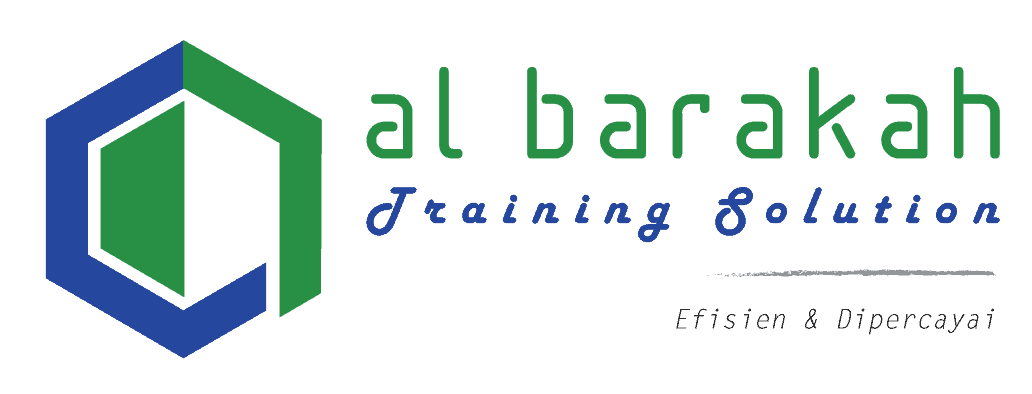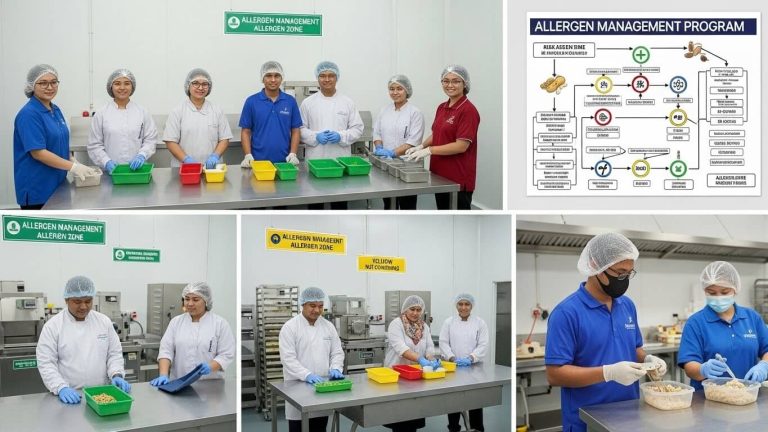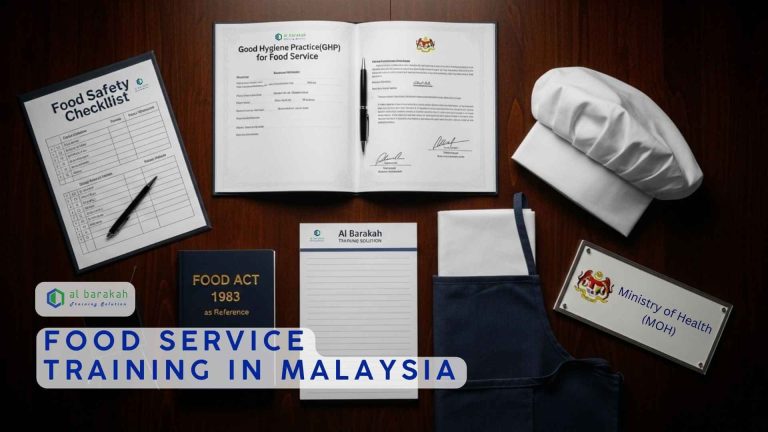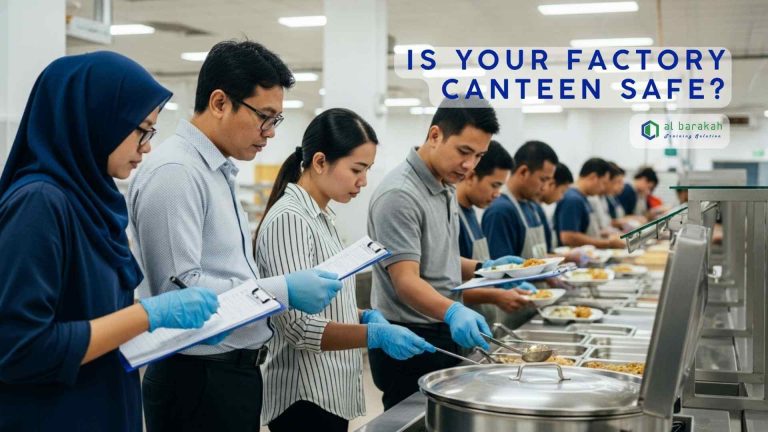The Ultimate Guide to Food Allergens in Malaysia
Navigating the vibrant and diverse food landscape of Malaysia is a delight, but for those with food allergies, it can be a hidden minefield. From the ubiquitous use of belacan (shrimp paste) to the ground peanuts sprinkled over a classic rojak, understanding food allergen in Malaysia is not just a matter of dietary preference—it’s a critical component of public health and safety.
Whether you’re a concerned consumer, a parent, or a food industry professional, this definitive guide provides the essential knowledge you need. We will demystify the most common allergens, uncover their hidden sources in local cuisine, explain Malaysian labeling laws, and outline the crucial steps for effective management and training.
Millions of people worldwide are now affected by the rising prevalence of food allergies. An allergy is an immune system overreaction to a normally safe substance, such as a food protein, which can result in mild to severe symptoms, such as hives and swelling, as well as anaphylaxis, a potentially fatal reaction.
What Are Food Allergens? (The Basics)
Before we dive into the specifics of the Malaysian context, let’s start with a fundamental question: what exactly are food allergens?
A food allergen is a protein or protein fragment found in food that causes allergic individuals’ bodies to react negatively. About 90% of all food allergies are caused by the top ten food allergens: peanuts, tree nuts, fish, shellfish, eggs, milk, soy, and wheat. Sesame, mustard, and celery are some other less typical allergens.
The majority of food allergens are heat-resistant, which means they can withstand heating processes like baking and cooking. Due to cross-contamination during production or handling, they can also be discovered in traces in processed foods even if they are not listed as an ingredient.
Any protein molecule in food that can in some people cause an immune reaction is referred to as a food allergen. When a person has a food allergy, their immune system perceives certain proteins as dangerous and makes antibodies to combat them.
Itching, hives, swelling, and even anaphylaxis, a severe and potentially fatal reaction, can all be brought on by the antibodies’ release of chemicals like histamine. Milk, eggs, peanuts, tree nuts, fish, shellfish, wheat, and soy are the most typical food allergens.

In simple terms, a food allergen is a typically harmless protein that triggers an abnormal response from the body’s immune system. When someone with a food allergy eats even a tiny amount of the offending food, their body mistakenly identifies the protein as a threat—like a virus or bacteria—and launches an attack. This overreaction is what causes the symptoms of an allergic reaction.
It’s crucial to distinguish between a food allergy and a food intolerance, as they are often confused:
Food Allergy: Involves the immune system. Reactions can be severe and life-threatening (anaphylaxis), and even trace amounts can cause a problem. Symptoms include hives, swelling, wheezing, and dizziness.
Food Intolerance: Involves the digestive system. It occurs when the body cannot properly break down a certain food, often due to enzyme deficiencies. Reactions are generally less serious and are usually limited to digestive discomfort like bloating, gas, or diarrhea.
Understanding this distinction is the first step in managing risks effectively, which is especially important in a country with a complex and ingredient-rich food culture like Malaysia’s.
The 8+ Most Common Food Allergens in Malaysia
Malaysia’s culinary heritage is a beautiful tapestry of Malay, Chinese, and Indian influences. However, this diversity means that common allergens can appear in unexpected places. For individuals with allergies, knowledge isn’t just power—it’s protection.

The following table outlines the allergens mandated for declaration by the Malaysian Food Regulations 1985, along with other frequent culprits, giving you a clear overview of what to watch for.
| Allergen | Why It’s Common in Malaysia | Key Malaysian Culinary Examples & Hidden Sources |
|---|---|---|
| 1. Crustaceans (Shellfish) | A cornerstone of flavour. Shrimp paste (belacan) is a fundamental base for countless dishes. | Sambal udang, Laksa, Curry Mee, Hokkien Mee, Mee Goreng, Nasi Goreng Kampung, Cencaluk, Belacan (used in sambal, soups, and sauces). Hidden Risk: Even dishes without visible prawns may use belacan in the paste or stock. |
| 2. Eggs | A universal binding and leavening agent, essential in both traditional and modern cooking. | Kek (cakes), Kuih (especially kuih lapis, onde-onde, curry puffs), some types of Mee (noodles), Roti Canai/Paratha dough, sauces like mayonnaise. |
| 3. Fish | A primary protein source, used fresh, dried, and fermented. | Ikan Bakar, Fish Head Curry, Assam Pedas, Fish Ball Noodles, Budu, Cincalok. Hidden Risk: Fish sauce and fermented fish products are used as seasoning in many gravies and stir-fries. |
| 4. Peanuts | Widely used as a garnish, in sauces, and as a base for flavour. | Satay Sauce (kuah kacang), Gado-Gado, Rojak, certain Kuih, Pisang Goreng with peanut dip, some biscuit and snack toppings. |
| 5. Soybeans | A versatile ingredient in many forms, from solid to condiment. | Tauhu, Tempe, Tau Kwa, Soy Milk, Kicap (soy sauce – light and dark), Taucu (fermented bean paste), vegetarian meat substitutes. Hidden Risk: Soy sauce is ubiquitous in marinades, stir-fries, and as a table condiment. |
| 6. Milk | While less common in traditional Malay cuisine, it’s prevalent in Mamak (Indian-Muslim) and modern foods. | Teh Tarik, Roti Canai/Naan (often brushed with ghee or butter), Dalca (lentil curry with yogurt), modern cakes, pastries, and ice cream. |
| 7. Tree Nuts | Often used in desserts, drinks, and as garnishes. | Badam (Almonds) in Badam Milk and some biscuits, Cashew nuts in stir-fries and curries, Walnuts in baked goods. |
| 8. Gluten (Wheat) | Found in noodles, breads, and as a thickening agent. | Mee (wheat noodles), Roti, Naan, and other Mamak breads, Kuih, Kicap (soy sauce), Worcestershire sauce, some processed meats. |
| + Sesame Seeds | Common as a garnish and in oils. | Sesame seed toppings on buns and some kuih, sesame oil used as a flavour enhancer in stir-fries and soups. |
| + Molluscs | Popular in specific dishes, especially in coastal areas. | Sotong (Squid) in Sotong Goreng Tepung or Sambal Sotong, Kerang (Cockles) in Char Kway Teow, Lala (Clams) in Lala Soup. |
Detailed Explanations for the Malaysian Context
Let’s break this down further to ensure every Malaysian reader can navigate these allergens with confidence.
The “Big Two” in Malaysian Cuisine: Shellfish & Peanuts
Shellfish (Crustaceans): This is arguably the most challenging allergen to avoid in Malaysia. Belacan is the single biggest hidden danger. It is a dried, fermented shrimp paste that is toasted and pounded into a base for sambal, which is then used in hundreds of dishes like laksa, nasi lemak gravy, and sambal kangkung. The key takeaway: Always ask if a dish contains belacan, even if you don’t see any prawns. Phrases like, “Ada belacan dalam masakan ini? Saya alahan udang.” (Is there belacan in this dish? I am allergic to shrimp) are essential.
Peanuts: Peanut-based sauce (kuah kacang) is a beloved staple. The risk isn’t just with obvious dishes like satay. Cross-contamination is a major issue at food stalls where the same spoon used for satay sauce might be used for other dishes, or where peanuts are ground on the same surface used for other food preparation. When ordering rojak or gado-gado, you must explicitly state “Tolong, tanpa kacang” (Please, without peanuts).
The Ubiquitous Seasonings: Soy & Fish
Soybeans: The problem isn’t just tofu and tempeh. Kicap (soy sauce) is used in almost every stir-fried noodle and rice dish, in marinades for meats, and as a dipping sauce. Many gravies, including some that appear dark, may be coloured with dark soy sauce. Always inquire about the seasoning base.
Fish: Similar to shellfish, the hidden risk lies in fermented products. Budu (fermented fish sauce from the East Coast) and cincalok (fermented small shrimps) are powerful condiments. While common in specific regional dishes, their use can be unexpected. Fish-based stocks are also common in noodle soups like mee sup.
Navigating the Mamak Stall: Milk & Wheat
Milk & Dairy: The primary source of dairy in local cuisine comes from Mamak restaurants. Ghee (clarified butter) is often used to cook roti canai and naan, giving it a rich flavour and flaky texture. Teh tarik is, of course, made with condensed or evaporated milk. If you have a dairy allergy, specify “Roti tanpa minyak sapi/marjerin” (Roti without ghee/margarine) and “Teh ‘O’” (Tea without milk).
Gluten (Wheat): For those with Celiac disease or gluten intolerance, Mamak stalls and noodle dishes are the main areas of concern. Beyond the obvious wheat noodles (mee), note that kicap (soy sauce) contains wheat and is used extensively. Some kuih are also made with wheat flour.
Pro Tip for Malaysians: When eating out, communicate clearly and specifically.
Don’t just say “I have allergy.” Say, “Saya ada alahan [udang/kacang/susu]. Makanan ini ada masukkan [belacan/kuah kacang/minyak sapi]?” (I have a [shrimp/peanut/milk] allergy. Does this dish contain [belacan/peanut sauce/ghee]?). This direct questioning is far more effective.
Hidden Allergens in Popular Malaysian Cuisine
Knowing which allergens exist is one thing. Knowing where they hide in the food you love is everything. This section is your practical guide to navigating the hawker centres, mamak stalls, and restaurant menus safely.

Is Laksa Safe for a Shellfish Allergy? The Belacan Dilemma.
The Short Answer: Almost never safe. Laksa is one of the highest-risk dishes for anyone with a shellfish allergy.
The Core Risk – Belacan: The rich, flavourful broth of most laksa varieties (especially Laksa Lemak and Laksa Johor) is built on a base that includes belacan (fermented shrimp paste). Even if you don’t see a single prawn, the stock itself is a direct derivative of shellfish.
The Garnish Risk: Many laksa bowls are also topped with fresh or boiled prawns.
The Cross-Contamination Risk: In a busy hawker stall, the same ladle used to stir a prawn-based sambal or the same pot used to boil prawns is highly likely to be used in the laksa preparation.
What to Do: If you have a shellfish allergy, it is safest to avoid laksa altogether unless you can 100% verify with the vendor that they use a belacan-free paste and have strict allergen protocols, which is exceedingly rare.
Navigating the Mamak Stall: Roti, Kuah, and Cross-Contact.
The mamak stall is a Malaysian institution, but it’s a complex environment for allergies. Here’s a dish-by-dish breakdown:
Roti Canai / Naan / Paratha:
- Allergen Risk: Milk & Wheat.
- The Hidden Source: The dough is often made with milk or yogurt to achieve its soft, flaky texture. It is almost always cooked on a griddle with ghee (clarified butter). If you have a dairy allergy, you must request “roti tanpa minyak sapi, guna minyak sayur sahaja” (roti without ghee, use vegetable oil only).
Kuah (Curries & Dhal):
- Allergen Risk: Shellfish, Peanuts, Milk.
- The Hidden Source: While dhal is typically safe, some curries (like certain korma) may use yogurt or milk. The significant risk is cross-contact. The same large container used to serve one curry might be rinsed and used for another, transferring allergens. A spoon from the fish curry can easily find its way into the dhal.
Mee Goreng / Nasi Goreng:
- Allergen Risk: Shellfish, Soy, Wheat, Eggs, Peanuts.
- The Hidden Source: This is a “catch-all” dish. The wok is likely seasoned with soy sauce (soy, wheat), might use belacan or shrimp paste in the sambal (shellfish), is often cooked with egg, and may be garnished with fried prawns and a squeeze of kuah kacang (peanuts).
Mamak Stall Strategy: Be highly specific. Point to the dishes and ask direct questions:
“Kuah ini ada udang atau susu?” (Does this gravy have shrimp or milk?). Visually, stalls with clear separation between dishes and dedicated serving utensils are safer.
The Sweet Danger: Hidden Allergens in Kuih and Traditional Desserts.
Kuih are beautiful, colourful, and often full of hidden allergens. Their ingredients are rarely listed.
Eggs & Milk: Found in custard-based kuih like kuih tat and kuih lapis. Many steamed kuih use coconut milk, which is generally safe for dairy allergy sufferers (it is not a mammal’s milk), but some recipes might incorporate condensed milk.
Peanuts & Sesame Seeds: Commonly used as fillings or garnishes. Onde-onde might have a peanut filling, and many kuih are sprinkled with sesame seeds.
Wheat (Gluten): While many kuih are rice-based, some, like certain karipap (curry puffs), use wheat flour for the pastry.
Soy: Some modern or Chinese-influenced desserts might use soy milk or tofu.
Dessert Strategy: When buying from a bakery or stall, always ask about the ingredients. For pre-packaged kuih, check for any allergen labeling, though this is not always reliable.
Allergic reactions to food and cross-contamination
When a food comes into contact with an allergen while being processed or handled, the process is known as cross-contamination, and the end product may contain trace amounts of the allergen.
This can happen in a variety of ways, such as when equipment is not thoroughly cleaned after each use, when ingredients containing allergens are stored close to ingredients without allergens, or when workers do not adhere to proper hygiene and sanitation guidelines.
Food manufacturers must follow strict procedures to prevent cross-contamination because allergens, even in trace amounts, can be harmful to people with food allergies. To prevent cross-contact, this may entail using different tools, specific production lines, and appropriate cleaning techniques.
The “Innocent” Sauces and Condiments.
This is the deepest level of hidden allergens. The small bowls of sauce on the table can be a major risk.
Sambal Belacan: The name says it all. A direct mixture of chillies and shrimp paste.
Kuah Kacang (Peanut Sauce): The primary risk for peanut allergies.
Cincalok/Budu: Fermented seafood condiments.
Soy Sauce (Kicap): Contains soy and wheat.
Worcestershire Sauce: Surprisingly, contains anchovies (fish) and often soy and wheat.
Condiment Strategy: The safest approach is to avoid shared or unlabeled condiments. Bring your own safe sauces if necessary.
Food Allergen Labeling Laws in Malaysia: Your Rights and Responsibilities
For individuals with food allergies, clear labeling is a lifeline. For food businesses, it is a legal and ethical obligation. Understanding the Malaysian Food Regulations 1985 is crucial for both parties.
Given the potentially serious effects of food allergies, it is essential that food producers accurately label their products with any allergens they may contain. Food allergens are governed and required to be listed on food labels in many nations, including the United States and the European Union. According to these laws, food producers must expressly list any of the eight most typical allergens in the ingredients list or in a separate statement, such as “contains peanuts. “.
Accurate food labeling is essential for people with food allergies, as it helps them identify foods that may contain allergens and avoid potential allergen exposure. However, it is also essential for manufacturers to properly identify the presence of allergens in their products to prevent the risk of cross-contamination during processing and packaging.
What the Law Says: Mandatory Declaration
The Malaysian Food Act and the Food Regulations 1985 are the primary governing documents. The most critical update for allergen awareness is the amendment that mandates the declaration of the following eight major allergens whenever they are used as a deliberate ingredient in pre-packaged food:
Cereals containing gluten (e.g., wheat, barley, rye, oats)
Crustaceans and crustacean products
Eggs and egg products
Fish and fish products
Peanuts and peanut products
Soybeans and soybean products
Milk and milk products
Tree nuts and tree nut products (e.g., almonds, cashews, walnuts)
What This Means for You as a Consumer:
You have the right to clear information. On any pre-packaged food product made in or imported into Malaysia, these allergens must be declared on the label. They are typically listed in the ingredient list, often in bold or highlighted text to make them stand out.
Example of a Compliant Ingredient List:
“Ingredients: Wheat Flour, Water, Palm Oil, Sugar, Peanuts, Salt, Soy Lecithin (Emulsifier).”
(Here,Wheat Flour,Peanuts, andSoy Lecithinshould be emphasized.)
The Critical Gaps: “May Contain” and Loose Foods
While the law is a strong step forward, there are important limitations you must be aware of:
Precautionary Allergen Labeling (PAL): Statements like “May contain traces of nuts” or “Made in a facility that also processes milk” are voluntary. There are no specific laws governing when or how these warnings should be used. This means a product without a “may contain” warning is not guaranteed to be free from cross-contamination.
Non-Prepackaged Foods (The Hawker & Restaurant Dilemma): This is the law’s biggest gap. The mandatory labeling requirements do not apply to food prepared and sold directly to the consumer, such as:
Hawker stall food
Restaurant meals
Bakery items sold loose without packaging
Catered food
This is why the knowledge from the previous section is so vital. When eating at these establishments, you are relying on the staff’s knowledge and your own ability to ask the right questions.
Responsibilities for the Food Industry in Malaysia
For restaurant owners, caterers, hawkers, and food manufacturers, compliance and customer safety go hand-in-hand.
Pre-Packaged Food Manufacturers: You are legally required to clearly declare any of the 8 major allergens in your product’s ingredient list.
Food Service Establishments (Restaurants, Cafes, Hawkers): While not legally required to provide printed allergen information, you have a duty of care under general food safety principles. Failure to disclose allergens when asked, or negligent cross-contamination that causes harm, can lead to:
Civil lawsuits for damages.
Reputational damage that can destroy a business.
Action by the Ministry of Health if a serious incident is reported.
The Solution for Businesses: Proactive allergen management is the only way to ensure safety and compliance. This includes:
Maintaining accurate ingredient information for all dishes.
Training staff comprehensively on allergen awareness, cross-contamination prevention, and how to properly answer customer inquiries.
Implementing clear protocols in the kitchen for handling allergen-free orders.
Call to Action (For Business Owners):
Protecting your customers and your business starts with proper training. Our Food Allergen Awareness Training program is specifically designed for the Malaysian food industry, covering these regulations, practical kitchen management, and customer communication. [Click here to learn more and get your team trained.]
Managing Food Allergens: A Guide for the Food Industry (Beyond Basic Compliance)
For food businesses in Malaysia, effective allergen management is no longer a matter of choice—it’s a critical component of food safety, legal protection, and brand reputation. Simply knowing the laws is not enough; you must implement a proactive system to prevent incidents.
Why Allergen Management is Non-Negotiable
Consumer Safety is Paramount: The consequence of a failure is not just a dissatisfied customer; it can be a life-threatening medical emergency. The moral and ethical imperative to prevent harm is the most important reason.
Legal and Financial Liability: As outlined in the previous section, negligence can lead to lawsuits, severe financial penalties from authorities, and permanent closure. Proactive management is your best defense.
Protecting Your Brand’s Reputation: In the age of social media, a single allergen incident can cause irreparable damage to the trust you’ve built with your customers. Being known as a safe establishment is a powerful competitive advantage.
Integrating Allergen Control into Your HACCP Plan
Many Malaysian food businesses are familiar with HACCP (Hazard Analysis and Critical Control Points). Food allergens must be treated as a significant chemical hazard within your HACCP plan. Here’s how it integrates:
Principle 1: Conduct a Hazard Analysis.
- Action: Identify all allergens present in your raw materials (e.g., wheat flour, soy sauce, belacan, peanut oil). This is your first and most critical step.
Principle 2: Identify Critical Control Points (CCPs).
- Action: Determine the points in your process where allergen cross-contact can be prevented, eliminated, or reduced to an acceptable level. Key CCPs often include:
- Storage: Segregating allergen-containing ingredients.
- Preparation: Using dedicated equipment and surfaces for allergen-free meals.
- Cooking/Frying: Using dedicated fryers and oils (e.g., never frying prawn crackers in the same oil as french fries).
- Serving: Using dedicated utensils and ensuring staff hygiene (e.g., washing hands after handling allergens).
Principle 3: Establish Critical Limits.
- Action: Set measurable limits for your CCPs. For allergens, this is often a yes/no limit. For example: “The allergen-free meal must be prepared on a sanitized, dedicated cutting board.” (Limit = No cross-contact).
Principle 4 & 5: Establish Monitoring and Corrective Actions.
- Action: Train staff to monitor these CCPs (e.g., checking that colour-coded boards are used correctly) and define immediate actions if a limit is breached (e.g., if the wrong utensil is used, the food must be discarded and the meal remade safely).
A food allergen control plan is, in essence, a targeted application of your HACCP system. Without it, your HACCP plan is incomplete.
“Effective allergen management is a critical component of your overall HACCP-based food safety system. With the upcoming enforcement of MS 1480:2025 in 2026, the standard’s increased rigor in hazard analysis and control justification makes specialized training like this even more vital for compliance. Ensuring your team is proficient in allergen controls is a key step in preparing for a smooth transition to the new standard. Learn more about the broader changes coming with MS 1480:2025 and how to prepare: MS 1480:2025 Revision Changes.”
Essential Steps for a Robust Allergen Control Plan
Supplier Verification: Obtain and review specifications from all suppliers to confirm the allergen status of every ingredient.
Staff Training and Empowerment: This is the most crucial element. Your team must understand the “why” and the “how.” They must be able to:
Accurately answer customer questions about allergens in dishes.
Identify and manage cross-contact risks at every stage.
Execute the allergen protocols without fail.
Clear and Accurate Communication: This applies internally (labels in the kitchen, colour-coded equipment) and externally (menu descriptions, responding to customer inquiries).
Conclusion & Final Thoughts
Navigating the world of food allergens in Malaysia requires vigilance, knowledge, and a proactive approach from everyone involved—from the consumer asking the right questions to the food business implementing a rigorous safety system.
For consumers, this guide provides the knowledge to explore Malaysia’s incredible food culture with greater confidence. Your safety hinges on asking specific questions, being aware of hidden dangers, and reading labels carefully.
For the food industry, the responsibility is significant. Allergen awareness is a core pillar of modern food safety, intrinsically linked to established systems like HACCP. Moving beyond basic compliance to build a culture of safety is what will protect your customers, your team, and your business in the long term.
For Food Business Owners, Managers, and Trainers:
Understanding the theory is the first step. Implementing it consistently across your entire team is the real challenge—and where most failures occur.
Our expert-led Food Allergen Awareness Training is designed to bridge this gap. We translate complex regulations and HACCP principles into practical, actionable steps for the Malaysian kitchen. Our program doesn’t just tick a box; it builds a culture of safety that empowers your staff, protects your customers, and future-proofs your business.







